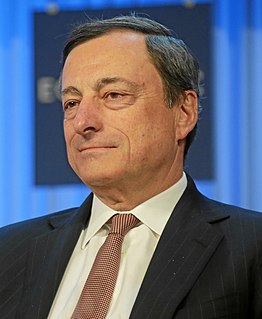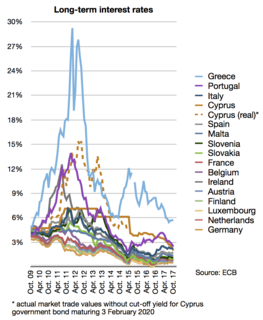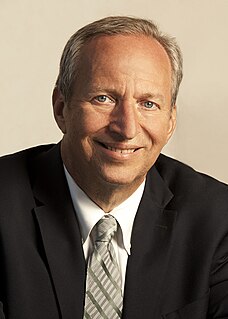
Political philosophy, also known as political theory, is the study of topics such as politics, liberty, justice, property, rights, law, and the enforcement of laws by authority: what they are, if they are needed, what makes a government legitimate, what rights and freedoms it should protect, what form it should take, what the law is, and what duties citizens owe to a legitimate government, if any, and when it may be legitimately overthrown, if ever.

The eurozone, officially called the euro area, is a monetary union of 19 of the 28 European Union (EU) member states which have adopted the euro (€) as their common currency and sole legal tender. The monetary authority of the eurozone is the Eurosystem. The other nine members of the European Union continue to use their own national currencies, although most of them are obliged to adopt the euro in the future.
Ricardo A. M. R. Reis is a Portuguese economist and the A. W. Phillips professor of economics at the London School of Economics. In a 2013 ranking of young economists by Glenn Ellison, Reis was considered the top economist with a PhD between 1996 and 2004., and in 2016 he won the Germán_Bernácer_Prize prize for top European-born economist researching macroeconomics and finance. He writes a weekly op-ed for the Portuguese newspaper Jornal de Noticias and participates frequently in economic debates in Portugal.

The President of the European Central Bank is the head of the European Central Bank (ECB), the institution responsible for the management of the euro and monetary policy in the Eurozone of the European Union (EU).
In economics, an optimum currency area (OCA), also known as an optimal currency region (OCR), is a geographical region in which it would maximize economic efficiency to have the entire region share a single currency.

Mario Draghi is an Italian economist who served as President of the European Central Bank between 2011 and 2019. Prior to that, he served as the Chairman of the Financial Stability Board from 2009 to 2011 and Governor of the Bank of Italy from 2005 to 2011.

The euro came into existence on 1 January 1999, although it had been a goal of the European Union (EU) and its predecessors since the 1960s. After tough negotiations, particularly due to opposition from the United Kingdom, the Maastricht Treaty entered into force in 1993 with the goal of creating an economic and monetary union by 1999 for all EU states except the UK and Denmark.
The Bernacer Prize is awarded annually to European young economists who have made outstanding contributions in the fields of macroeconomics and finance. The prize is named after Germán Bernácer, an early Spanish macroeconomist.

The Eurogroup is the recognised collective term for informal meetings of the finance ministers of the eurozone—those member states of the European Union (EU) which have adopted the euro as their official currency. The group has 19 members. It exercises political control over the currency and related aspects of the EU's monetary union such as the Stability and Growth Pact. The current President of the Eurogroup is Mário Centeno, the Minister of Finance of Portugal.
There are eleven currencies of the European Union as of 2018 used officially by member states. The euro accounts for the majority of the member states with the remainder operating independent monetary policies. Those European Union states that have adopted it are known as the eurozone and share the European Central Bank (ECB). The ECB and the national central banks of all EU countries, including those who operate an independent currency, are part of the European System of Central Banks.

The European debt crisis is a multi-year debt crisis that has been taking place in the European Union since the end of 2009. Several eurozone member states were unable to repay or refinance their government debt or to bail out over-indebted banks under their national supervision without the assistance of third parties like other eurozone countries, the European Central Bank (ECB), or the International Monetary Fund (IMF).

The Economic and Monetary Union (EMU) is an umbrella term for the group of policies aimed at converging the economies of member states of the European Union at three stages. The policies cover the 19 eurozone states, as well as non-euro European Union states.

Fiscal union is the integration of the fiscal policy of nations or states. Under fiscal union decisions about the collection and expenditure of taxes are taken by common institutions, shared by the participating governments. A fiscal union does not imply the centralisation of spending and tax decisions at the supranational level. Centralisation of these decisions would open up not only the possibility of inherent risk sharing through the supranational tax and transfer system but also economic stabilisation through debt management at the supranational level. Proper management would reduce the effects of asymmetric shocks that would be shared both with other countries and with future generations. Fiscal union also implies that the debt would be financed not by individual countries but by a common bond.

The Euro summit is the meeting of the heads of state or government of the member states of the eurozone. It is distinct from the EU summit held regularly by the European Council, the meeting of all EU leaders.

Luis Garicano Gabilondo is a Spanish economist and politician who is currently a Member of the European Parliament (MEP) from Spain since 2019. He is also Vice President of Renew Europe and Vice President of the European political political party Alliance of Liberals and Democrats for Europe. Before working in Brussels, he has been Professor of Strategy and Economics at the Business School of the Business Institute and at the London School of Economics (LSE).

Withdrawal from the Eurozone denotes the process whereby a Eurozone member-state, whether voluntarily or forcibly, stops using the euro as its national currency and leaves the Eurozone. As of May 2019, no country has withdrawn from the Eurozone.

The Julis-Rabinowitz Center for Public Policy and Finance (JRC) is a leading research center at the Woodrow Wilson School of Public and International Affairs of Princeton University. Founded in 2011, the JRC primarily promotes research on public policy as it relates to financial markets and macroeconomics. The center has also expanded its research and teaching to multiple disciplines, including economics, operations research, political science, history, and ethics.


















